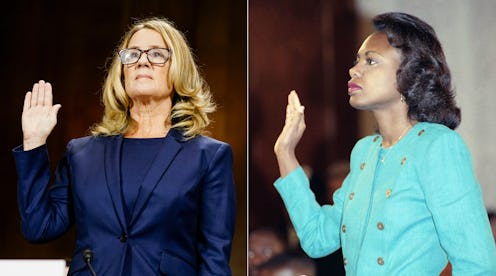News
Photos Of Anita Hill Vs. Christine Blasey Ford’s Hearings Have Haunting Similarities

You couldn't ignore the echoes of history this week in the Supreme Court confirmation process of Brett Kavanaugh. After an initial Senate Judiciary Committee hearing with the judge at the start of the month, a psychology professor, Christine Blasey Ford, came forward with an allegation of an attempted sexual assault, which Kavanaugh denied. Immediately, people across the country remembered Anita Hill's allegations of sexual harassment against then-Supreme Court candidate Clarence Thomas, which he also denied. Comparing Hill's and Ford's hearings reveal many similarities, despite the 27-year time difference.
Ford and Kavanaugh testified to the Senate Judiciary Committee on Thursday, with the heavy shadow of Thomas and Hill looming over them — a shadow that prompted the Republicans in the committee, who are still all men, to hire a female sex crimes prosecutor to question Ford so they could avoid any problematic questions like the ones Hill was asked. Ford was accommodating and polite — ever a lady wishing she could be more helpful— while Kavanaugh came in swinging — all "male indignation," as The New Yorker's Doreen St. Félix put it, taking swipes at the Senate Democrats and throwing questions back at them.
The gender dynamics on display reflected the scene in 1991, when "workplace sexual harassment" still wasn't largely understood as an issue and Hill's personal character was under trial. In both cases, those dynamics elicited a mass national outcry and conversation, complete with both written and physical protests, as women — and men — begged for a societal change where a woman's suffering would be deemed important enough for a man to face consequences, whether specifically related to this alleged incident or any other. This is how that looked.
Anita Hill & Christine Blasey Ford
Hill and Ford are both professors, but their alleged encounters with the men were very different. Hill, a law professor, alleged that Thomas sexually harassed her while she was working for him at the Equal Employment Opportunity Commission in the Education Department. Ford's allegation came from when she and Kavanaugh were in high school.
While both of their allegations prompted Judiciary Committee hearings, only Hill was given an FBI investigation — a contentious point in Ford's case that was not given.
"What I saw was an attractive woman in a blue suit before an all-male Judiciary Committee, speaking of her experience of sexual harassment," California Sen. Dianne Feinstein, the ranking Democratic member of the Senate Judiciary Committee, said on Thursday of Hill.
The same could be said of Ford, who arrived at the Senate in a blue suit herself, which many saw as a nod to Hill.
Shows Of Support In 'The New York Times'
In 1991, 1,600 black women paid for an ad in The New York Times to voice their support for Hill, writing that it was "in defense of ourselves," after Hill faced sexism and racism from senators, the media, and the public. Tayari Jones, an author, wrote on Twitter this month that she was one of the 1991 signers, and that though she didn't remember the name of the woman who invited her to join, "I remember that she said, you don’t have to pay to sign your name, but this is a moment for you to give money, and make a sacrifice, to show it matters to you. ... She gave me a chance to be part of history and she taught me a major life lesson."
A day before Ford testified this week, another ad appeared in The New York Times — this one signed by 1,600 men in support of both Ford and Hill, writing, "We believe Anita Hill. We also believe Christine Blasey Ford." That ad was put together by the Phenomenal Women Action Campaign.
House Women Protest
On Friday, when the Senate Judiciary Committee met to discuss Kavanaugh before having a vote, a group of female House Democrats marched into the room, silently voicing their protest of the process. The day before, five Democratic congresswomen who are also victims of domestic and sexual assault sent a letter to President Donald Trump and Senate Majority Leader Mitch McConnell demanding an apology for Ford.
Similarly, in 1991, seven female Democratic House members marched to the Senate as a sign of protest and support for Hill.
Clarence Thomas & Brett Kavanaugh
Thomas and Kavanaugh were both nominated by Republican presidents and both got their law degree at Yale. Both nominees vehemently denied the allegations against them — even, at least once, using the same language.
"This is a circus," both Thomas and Kavanaugh said. "This confirmation process has become a national disgrace," Kavanaugh said, echoing Thomas' claim that "it's a national disgrace."
The Senate Judiciary Committee
In 1991, Hill faced questioning from a group consisting entirely of white men. Ford's situation was marginally "better" — there are currently four women on the Senate Judiciary Committee (all Democrats) and slightly more diversity within it.
Ultimately, the makeup of this committee matters to the end results of these moments. Despite Hill's testimony, Thomas was confirmed onto the Supreme Court. With the current situation in the Senate, which is a majority Republican, it looks likely that Kavanaugh will, too, persist onto a lifetime appointment on the Supreme Court, unless at least two Republicans stand against him and all Democrats vote against him as well. In the 27 years between the two women's remarkable testimonies, conversations have changed, but men still rule in Congress.
However, after Hill's testimony, a wave of women were spurred to jump into politics and were elected in record numbers. It looks like that could be the situation this fall, too — though it would be too late to affect Kavanaugh's confirmation.